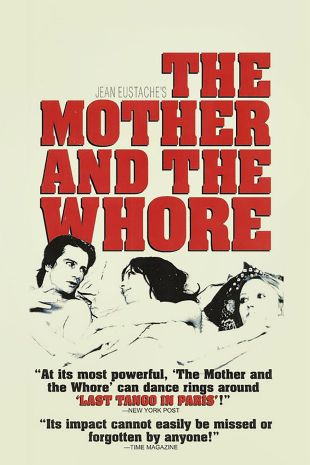
The late Jean Eustache directed this bitter and sobering, 3 1/2 hour marathon drama that cuts like a razor blade as it systematically eviscerates the existentialism of post-1968 European youth and the myths of the 1970s sexual revolution. Jean-Pierre Leaud stars as Alexandre - a smarmy, obnoxious chauvinist pig who cruises Parisian streets looking for easy sex and specializes in long, vacuous pseudo-intellectual monologues that he uses to try to impress pick-ups. In the picture's most memorable sequences, Alexandre repeatedly attempts to conduct a menage-a-trois with two women (Francoise Lebrun and Bernadette Lafont) in his shabby apartment. Instead of using the sex to turn us on, Eustache takes a clinical approach, enabling us to observe the conceptual cruelty of the orgy. When one woman is briefly satisfied by Alexandre's attentions, the other feels left out, abandoned, defeated - then as he shifts his attention to the second bedmate, the fallout recurs - this time with the first partner. And Alexandre's incessant seduction and molestation of the emotionally battered Veronika (Lebrun) have a cumulative effect: in the picture's heartbreaking final act, the tremulous and broken girl disintegrates before our eyes, and through a veil of tears, explicitly details the horrors she has endured at the hands of various men, as well as her self-perception as a tool. Her confessions have explosive implications. They speak not only for herself, but for the millions of other women who have been sexually exploited with romantic pretensions; the words also attack the slimy faux use of "equal rights" as an excuse for men to get laid - a trend that became modish in the '70s. All three actors give the performances of their careers. The enlistment of Leaud is particularly relevant; just as he helped inaugurate the Nouvelle Vague as Antoine Doinel in The 400 Blows (1959), so his lead in The Mother and the Whore formally signaled the New Wave's end - and this film has been read as a scathing commentary on that whole movement. Critic David Thomson compared this magnificent work of art to a ferocious caged beast that he would love to set free on an unsuspecting public when contemporary movies grow too dull. Thomson's insights are correct; there has never been another film remotely like it, and it is arguably the single most effective drama ever made on the gender politics of sexuality. Unfortunately, due to well-publicized rights issues, Maman/Putain has become somewhat difficult to see, although old VHS tapes and a 2002 Japanese DVD release do exist, and the picture periodically screens on European television. In this case, landing a copy is worth whatever effort it may require.
